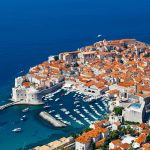The Chinese interest in Croatian projects is continually growing, or so it seems, and there is now room to dare when it comes to the potential Chinese rescue of Uljanik and 3 Maj at the eleventh hour.
As Marija Brnic/Poslovni Dnevnik writes on the 2nd of May, 2019, the Chinese CSIC representatives currently visiting Croatia to see the state of Croatia’s ailing Uljanik (Pula) and 3 Maj (Rijeka) shipyards have expressed clear interested in new projects with Croatia’s shipyards, but only if the Croatian state covers the cost of what has already failed, there have also been mentions of the diversification of production, but they don’t want guarantees.
If there is an agreement between the Croatian Government and the Chinese CSIC about reviving Uljanik and 3 Maj, it will be done so with regard to a combination of the models which were discussed with the previous two strategic partners, Darko Končar and Tomislav Debeljak.
According to the explanation given by Minister of Economy Darko Horvat after the final talks and the three-day visit of CSIC’s representatives, the Chinese are indeed interested in starting with new projects, while the state should cover the cost of old, failed projects, meaning it will need to take place on a clean slate. It’s also more than likely that the sites of today’s Croatian shipyards will see other projects developed there, that is to say, the diversification of activities will occur.
“If they don’t see the possibility of continuity of shipbuilding at this time, we want other industries to take place here, and not just those exclusively involved in shipbuilding,” Minister Horvat stated. Therefore, unlike Danko Končar’s initial idea, Chinese diversification would not be a real-estate business, but would involve some sort of other, new production aside from shipbuilding. And the clean starting position the Chinese have indicated that they want, which is similar to what Tomislav Debeljak sought but is unlike his idea, almost certainly means declaring the bankruptcy of the two shipyards.
“We don’t expect them to finance failed attempts to build ships that haven’t been completed. The starting position means new projects,” stated Horvat in reference to the wishes of the Chinese.
The continuation of construction in Pula and Rijeka in partnership with CSIC would in any case have a completely different financing philosophy. The Chinese say, after the talks, that they are completely astonished at the reliance of state guarantees for shipbuilding. To repeat what Finance Minister Zdravko Marić stated recently, it’s much too early to talk about exactly what changes might occur in this context following their entry into Uljanik and 3 Maj. Over the next few weeks, CSIC’s senior people will analyse the collected information and determine whether or not, and indeed in what form they’re interested in entering into the structures of Croatia’s enfeebled shipyards.
At this moment in time, Darko Horvat has merely announced that any form of Chinese entry would involve a new way of financing, with different sources, a different way of drafting project documentation, and would involve no state guarantees. After the final talks at Zagreb Airport, Horvat didn’t provide any more specific information, nor the deadlines within which he expected to receive feedback from the Chinese, but he did appear to try to leave the impression that he was optimistic about the whole situation. The Chinese representatives themselves, however, didn’t give any media statements.
Make sure to follow our dedicated business page for more information on Chinese-Croatian business relations, Chinese projects and investments in Croatia, doing business, working and investing in Croatia and much more.
Click here for the original article by Marija Brnic for Poslovni Dnevnik








